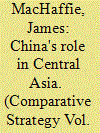|
|
|
Sort Order |
|
|
|
Items / Page
|
|
|
|
|
|
|
| Srl | Item |
| 1 |
ID:
099711


|
|
|
|
|
| Publication |
2010.
|
| Summary/Abstract |
Central Asia, the collective Central Asian states that were a part of the former Soviet Union, is a land not well known to many peoples of the West, or East for that matter. A land of mystery perhaps, but it is also a land of strategic importance for both the West and the East. Situated between Europe and the Far East Asia, the states there have been invaded, conquered, and occupied by several different empires over the centuries. This article addresses Kazakhstan, Kyrgyzstan, and Tajikistan, their strategic importance, their relationship with China, and the strategic implications of that relationship for Russia and the United States. There is a potential for either wide conflict or cooperation among the three great powers in this region. So far, the pivot appears to be China. Driven by its demand for energy, among other things, China has staked a claim in the three Central Asian states that border it.
|
|
|
|
|
|
|
|
|
|
|
|
|
|
|
|
| 2 |
ID:
182421


|
|
|
|
|
| Summary/Abstract |
It has long been assumed that security communities form in the international system based on at least two criteria, having a strong collective identity and mutual trust among their members. Security is gleaned through mutual trust, while community coalesces around a strong collective identity and shared values. The Shanghai Cooperation Organization exhibits traits of a security community, where its structure is designed to institutionalize mutual trust, but the organization lacks a cohesive collective identity, especially since the inclusion of India and Pakistan into the organization, which has caused a weakening in the Russia-China driven identity within the intergovernmental organization. This paper examines how the SCO can function as a security community, arguing that a strong collective identity is only a sufficient condition for the establishment of a security community, mutual trust being the only ingredient necessary for a security community to form.
|
|
|
|
|
|
|
|
|
|
|
|
|
|
|
|
|
|
|
|
|